|
|
|
Sort Order |
|
|
|
Items / Page
|
|
|
|
|
|
|
| Srl | Item |
| 1 |
ID:
189878


|
|
|
|
|
| Summary/Abstract |
Post–World War II thinking about security, prosperity, and development emphasized macro-level explanations, applied across widely varied temporal and spatial scales. Western scholars of International Relations (IR) were preoccupied with questions of strategic balance and world order, typically focusing on possibilities for war and peace through one of two lenses, Realist or Idealist. Similarly, challenges of prosperity and development were understood in competing “modernization” or “dependency” terms, where “underdevelopment” was seen as the product of either “backward” states or an exploitative world system. In almost every case, the unit of analysis was the sovereign state operating in an anarchical inter-state (or international) system. Over time, many came to perceive these dominant explanations of (dis)order not only as deficient analytically but harmful in practice. Put differently, the actual course of world events rarely, if ever, matched the outcomes expected by the theorists.
|
|
|
|
|
|
|
|
|
|
|
|
|
|
|
|
| 2 |
ID:
189881


|
|
|
|
|
| Summary/Abstract |
The literature on world regions is largely gender-blind. This article suggests ways in which the study of regionalism can incorporate gender analysis, based on the case of North America. It argues that this can be done in three ways: through an examination of the gendered impact of regional integration; through an examination of how gender concerns are, or can be, mainstreamed into regional policies; and through research on new forms of feminist-inspired activism that may shape regional outcomes. After applying these perspectives to the case of North America and the new Canada–United States–Mexico Agreement, it argues that despite the failure of the Canadian government to achieve the inclusion of a gender chapter, the inclusion of language around gender discrimination in the labour chapter makes the new agreement a more effective (if still limited) tool for promotion of some forms of gender equality.
|
|
|
|
|
|
|
|
|
|
|
|
|
|
|
|
| 3 |
ID:
189883
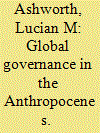

|
|
|
|
|
| Summary/Abstract |
This article adumbrates how we can re-envision global governance in the Anthropocene. The first section explores the plurality of Anthropocenes through an initial analysis of the Great Transformation since 1950. The second section focuses on what this means for global governance through insights from the history of international thought. The first insight comes from earlier works by the international functionalists, who emphasized process over goals. The second is found in the international political geography of Derwent Whittlesey, who outlined how we could take in ecological concerns through a four-dimensional view of the industrial world. Here I will also stress the growing importance of the concept of waste and refuse in global governance, a concern that becomes visible when we think about global politics in four dimensions. The final concluding section underscores how a messy and unprecedented crisis requires an equally messy and unprecedented approach to global governance.
|
|
|
|
|
|
|
|
|
|
|
|
|
|
|
|
| 4 |
ID:
189884
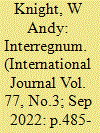

|
|
|
|
|
| Summary/Abstract |
There is a crisis of global governance at this moment in our history -- a moment being labeled as 'the interregnum -- a moment of transition from one world order to another. The turbulence and disequilibrium of this moment in our history have triggered intense and growing interest in the concept and practice of governance at all levels. This is not a reflexive moment; it is a time for serious reflection and contemplation; a time for reconceptualizing ‘global governance’; an auspicious moment for constructing a new global governance paradigm. To assist in this introspective exercise, it may be important to shift from 'problem-solving' theorizing to a 'critical theory' approach that stands outside prevailing understandings of what global governance has come to mean and discard the oversimplified state-centric vision of world order; replacing it with the more nuanced 'summative' global governance - a concept that is more sophisticated and flexible than previous ones and may provide the needed space and time for us to transform the practice of global governance.
|
|
|
|
|
|
|
|
|
|
|
|
|
|
|
|
| 5 |
ID:
189886
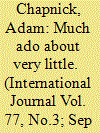

|
|
|
|
|
| Summary/Abstract |
Ever since Canada failed to be elected to the United Nations Security Council as a non-permanent member in June 2020, there have been calls for Ottawa to realign Canadian foreign policy with the national interest. It is hardly the first time that such a plea has been made: critics advocated similarly in the 1870s, the 1930s, the 1960s, and the 2000s. Yet, in each case, they recommended a different policy solution. Having reviewed these episodes, this essay concludes that the real debate in Canadian foreign policy has never been about the national interest, per se. To borrow from the language of strategy, Ottawa’s critics have merely privileged different “ways” of achieving the same “ends,” while everyone yearns for the “means” to do more.
|
|
|
|
|
|
|
|
|
|
|
|
|
|
|
|
| 6 |
ID:
189885
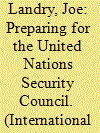

|
|
|
|
|
| Summary/Abstract |
In the run up to Canada’s bid for a seat on the United Nations Security Council (UNSC), Global Affairs Canada undertook thorough policy preparations to prepare for a potential term. Notwithstanding the unsuccessful vote on Canada’s candidacy, sharing our approach to policy design is worthwhile so that current and future policymakers can replicate these efforts and learn lessons from our experience. Indeed, transparency and openness are critical to the functioning of liberal, democratic institutions; seeing “how the sausage is made” can improve public perceptions of government accountability, which is critical in a time of waning trust in institutions. Given the wide breadth of issues that UNSC member states must be ready to engage on, the team designed a cross-cutting approach to policy development which ensured that stakeholders were able to provide valuable input to help shape Canadian positions. This process involved the crafting of “signature initiatives” and position papers to advance Canadian priorities in a structured and effective manner over the course of the potential UNSC term.
|
|
|
|
|
|
|
|
|
|
|
|
|
|
|
|
| 7 |
ID:
189882


|
|
|
|
|
| Summary/Abstract |
Over the past few decades, regions and regional institutions have gained increased attention in both scholarly literature and policy debates. A fundamental weakness in both debates, however, is the simplified focus on state actors and the official goals and policies of regional international organizations and inter-state frameworks. This article addresses this extant weakness by opening up for a more diverse empirical reality. By drawing on the new regionalism approach and two illustrative, comparative case studies from West Africa and East Africa, we offer new insights about how state and non-state actors interact in both formal and informal domains in order to produce variegated logics of regionalism that are poorly described by other theoretical perspectives. The article concludes by assessing the implications for theory and future research on regionalism in Africa and in other regions.
|
|
|
|
|
|
|
|
|
|
|
|
|
|
|
|
| 8 |
ID:
189879


|
|
|
|
|
| Summary/Abstract |
No matter how narrowly you focus your spatial or temporal lenses, you are bound to catch sight of multiple significant challenges to human community. Many of these challenges are shared, such as Covid-19, though their impacts on individuals and groups are felt unevenly. Some challenges are immediate and existential, such as the wars in Ukraine, Syria, and Yemen. Others, such as race, gender, caste, and class-based inequalities, are deeply embedded in social structures, providing privilege and persecution, and reward and oppression in unequal measures. And climate change, though slower moving, holds out the prospect of leading to total social collapse. How to make sense of these dramatic changes? This essay explores the adequacy of theories of IR and G/IPE in explaining the emergent world (dis)order. It argues that, whether orthodox or critical, theory must find a way to centre humanity within the biosphere if theory is to adequately inform practice.
|
|
|
|
|
|
|
|
|
|
|
|
|
|
|
|
| 9 |
ID:
189880
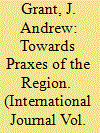

|
|
|
|
|
| Summary/Abstract |
While both formal and informal regionalisms examine the political ramifications of economic flows of capital, goods, and people, there is a blurring of such conceptual dichotomies in practice. Hence, in order to offer a more accurate account of the distinctions and overlap between the formal and informal – and to rectify the tendency to overlook the agency of African state actors and non-state actors – this article offers an agential constructivist approach that seeks to advance a praxis – or praxes – of the region. To that end, the article advances the concept of bifurcated interregionalisms as a means of analyzing cases of regional dynamics and regionalisms in Southern Africa and East Africa. The article concludes by offering some reflections on the future of regionalisms in an emerging global order in flux whereby illiberal and xenophobic variants of regionalisms compete with the liberal and cosmopolitan versions.
|
|
|
|
|
|
|
|
|
|
|
|
|
|
|
|
|
|
|
|
|